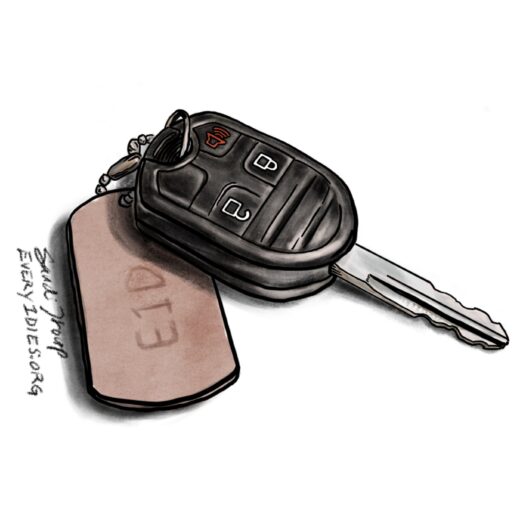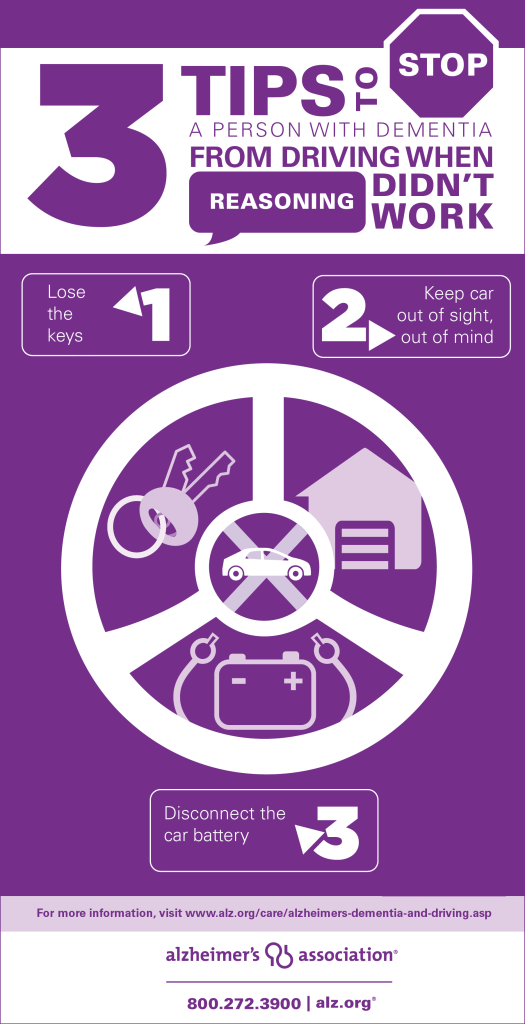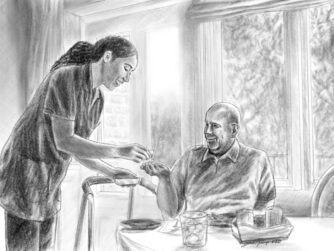Can someone with dementia still drive, and what are the signs that it is dangerous to yourself and others to continue? This week we will talk about safe driving how to know when it is time to give up your car keys, especially after a diagnosis of dementia.
In This Episode:
- 02:14 – Recipe of the Week: Tennessee Onions Casserole
- 02:53 – Remembering Jimmy Carter
- 07:39 – Driving with Dementia: When is it Time to Stop?
- 18:11 – How to Talk to Someone About Giving Up the Car Keys
- 26:05 – Outro
Can I Still Drive With Dementia?
Multiple types of dementia are progressive and gradually worsen over time. While individuals may still drive safely in the early stages of dementia, this becomes riskier as the disease progresses. Also be familiar with the laws in your state.
In the podcast, we talk about research that shows driving changes may be one of the first signs of dementia.
How Do You Know When It’s Time to Stop Driving?
We talk about several warning signs, such as:
– Getting angry, frustrated or confused
– Missing or disregarding traffic signs and signals
– Confusion about where they are going or where they are, even on familiar routes
All of us decline as we age. According to the National Aging and Disability Transportation Center: (See Brochure)
Chances are the physical and sensory skills you need to be a good driver are likely to decline as you age, and, as a result, you may have already changed some of your driving habits. For example, you no longer like driving…
- after dark because your night vision has worsened
- on the freeway because your reaction time is slower
- while making a left turn because you can’t always judge the distance between oncoming cars
Listen to the podcast for a full discussion about the warning signs and other factors to consider.
Why it is Important to Stop Driving Before It’s Too Late
Motor vehicle crashes are a leading cause of injury and death in older adults. Disease, age, changes in physical abilities can all impact safe driving. Cars are complicated two-ton machines that should only be operated by someone who can react quickly, understand the cues from other drivers and think logically in a changing environment.
Giving Up the Keys is Hard, But Here Are Some Alternatives
Medical facilities, local churches and community groups may also have volunteers who drive individuals to appointments and various locations. And don’t forget to reach out to family and friends.
There are several agencies to help you find the resources you need to maintain as much independence as possible. Your local Area Agency on Aging can help you search for nearby transportation options. Other resources, including the online Eldercare Locator and Rides in Sight, help determine transportation options for older adults. See below for more info.
- National Aging and Disability Transportation Center (NADTC) promotes the availability and accessibility of transportation options for older adults, people with disabilities and caregivers. www.nadtc.org or (866) 983-3222
- Eldercare Locator is the only national information and referral resource to provide support to consumers across the spectrum of issues affecting older Americans. (Administered by National Association of Area Agencies on Aging) eldercare.acl.gov or (800) 677-1116
- Rides In Sight is an information and referral service that helps older and mobility-challenged adults find local transportation options to help them stay mobile as they age. ridesinsight.org or 855-607-4337

Resources:
- Before You Give Up the Keys: Create a Roadmap for Transportation Independence
This brochure helps older adults to evaluate mobility needs, identify transportation options in their communities, and develop plans customized to their unique circumstances. - Transportation Options for Older Adults and People with Disabilities
The brochure describes various types of transportation services for older adults and people with disabilities and lists key questions to ask to determine the best option to meet individual needs. - A Talk with an Older Driver
This fact sheet offers tips on when and how to discuss driving with an older adult. - Tips for Providing Older Adult Care: Dementia and Driving.pdf
- Dementia-Related Driving Laws, Problems & Transportation Options
- NIA Alzheimer’s and Related Dementias Education and Referral Center
- Alzheimer’s Association
- Institute on Aging
Related Content:
- S4E40: How to Avoid a Car Accident and Stay Safe on the Road
- S3E47: Frontotemporal Dementia Part 1 – What Is FTD?
- S4E16: Understanding Vascular Dementia, the Second-Most Common Form
- S1E48: Alzheimer’s Disease
- S5E37: Memory and Alzheimer’s Disease
- S2E1: Lewy Body Disease
- S1E49: What to expect during screening for memory loss
- S1E34: Huntington’s Disease
How to Approach the Topic of Whether a Senior Should Stop Driving
How do you ask an elder to stop driving when it becomes unsafe? When the time comes that their driving in neither safe for them or the rest of the people on the road (and sometimes the sidewalk) we are faced with having “THE TALK”.
Charlie shared tips to make the conversation and time afterward go well, from framing it with compassion and sympathy to helping guide them to the right decision. For an older adult with dementia, it is also important to follow up by keeping the car and keys out of sight and helping create new routines.
Listen to the full segment to learn more about how to approach this difficult topic.
References:
- How to Talk with Your Elderly Parent About Giving Up Their Driver’s License – Institute on Aging
- Giving up Driving: How to have the Conversation – Vintage
- Dementia & Driving – Warner Law Offices PLLC
- Predicting Driving Cessation Among Cognitively Normal Older Drivers | Neurology
- Doherty, J. M., Murphy, S. A., Bayat, S., Wisch, J. K., Johnson, A. M., Walker, A., Schindler, S. E., Ances, B. M., Morris, J. C., & Babulal, G. M. (2022). Adverse driving behaviors increase over time as a function of preclinical Alzheimer’s disease biomarkers. Alzheimer’s & Dementia: The Journal of the Alzheimer’s Association, 10.1002/alz.12852.
Recipe of the Week
:max_bytes(150000):strip_icc():format(webp)/Southern-Living-Tennessee_Onions_011-8ef35d076b9242b7b70cd360bc931943.jpg)
We continue our road trip around the United States in search of state related famous recipes with our travels this week take us to Tennessee. Tennessee, the home of the Grand Ole Opry, Smoky Mountains, Elvis, Dollywood, and our recipe this week…an old-fashioned cheesy Tennessee-style onion casserole. Sweet Vidalia onions are the key. Head to Southern Living for the full recipe!

https://blog.feedspot.com/palliative_care_podcasts/










